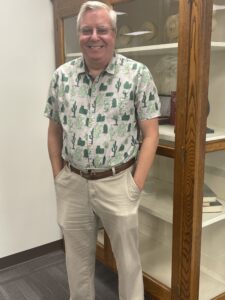In addition to academic advising and research, Dr. Grabowski currently teaches General Biology, Physiology and Pathophysiology for undergraduate and graduate students. He is often referenced by Titan alumni as a tough but favorite professor. Dr. Grabowski continues to build great relationships with his students.
Pre-Health Advisor Carmen Gamlin sat down with Biology Professor, Dr. Gregory Grabowski to discuss relationships between students and faculty.
1.What would you want a new science student to know about the student-professor relationship here at the University of Detroit Mercy?
We do lots of teaching (academic advising) and some research, so we’re kind of flipped; because of that we have a totally different dynamic with our students.
I’m not an (K-12) educator. I’m a Physiologist; I’m a Scientist, so we love questions…. you have to understand that we love it when you ask questions. That tells us is that you are interested; you’re engaged. We would rather answer (your) questions than not.
2. Please contrast a student professor relationship that is primarily advising, primarily research and then primarily course-based.
When I interact with students for advising… it’s more long term planning… So from the very beginning I’ll hand them and say here’s your sheet, this is what we’re going to follow (as far as your curriculum) and we might modify this based on your professional goals…I think when you are advising you see the long term goals of students and when you write a letter for a student like that, you can kind of put those components in
When you’re in a course...you’re seeing how they’re thinking and what their thought processes are…I always tell my students you should come to office hours…You are helping students in class in a practical way…So when in my courses, my office hours are more focused… I will see students as an individual or as a group.
Regarding Research: I think research falls in the same category as shadowing and maybe getting patient contact…You’re looking at the student’s work ethic, how they are acting professionally and problem solving…You get to know their abilities and then you get to leave them alone…When you’re working more one on one in a research lab…you get to see the student in action… Do they show up on time? Are they trustworthy?
3. Do you have any tips for Titans who will need individual letters of evaluation in their future from a science professor?

Know when you’re going to apply. A lot of times students think they are supposed to apply after they graduate college…you want to start earlier than that.
Some programs are a little bit harder than others. I always say it’s like gift-wrapping. Sometimes, you have programs that don’t have a lot of prerequisites; wrap up your resume in whatever way you feel and we’ll see if we like it or not. Then you have other programs that are very rigid in their requirements… We want you to use this particular wrapping paper and this type of bow… Then were going to access how well you do it…So I always tell students you want to look into that right away.
In addition to faculty advisors, all University of Detroit Mercy Titans have their Pre-Health Advisor, Carmen Gamlin who shares the academic, clinical and extracurricular activities required to competitively apply to graduate schools in the health professions. Freshmen through alumni can schedule appointments using the calendly app: https://calendly.com/prehealthadvisor .



